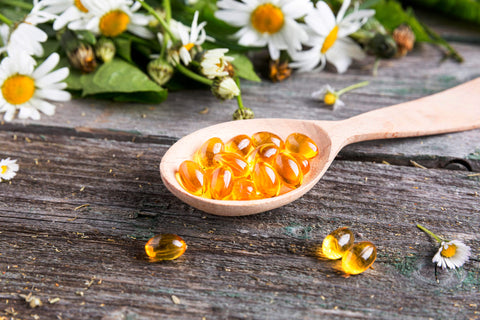Vitamin B5 (Pantothenic Acid) is a water-soluble vitamin from the B group of vitamins. It is important for the immune, nervous, and gastrointestinal systems, helps produce various hormones (including steroid hormones), and neurotransmitters (including serotonin) in the brain (1).
It contributes to the production of energy by breaking down fats and carbohydrates, helps reduce stress, and promotes normal cholesterol levels.
Its benefits include also promoting healthy skin, hair, eyes, and liver.
Pantothenic Acid is used in the synthesis of Coenzyme A, an enzyme that participates in a variety of reactions in the body, especially the breaking down of fatty acids.
Deficiency
The most common symptom of Vitamin B5 deficiency seems to be a burning feet sensation.
Other signs of deficiency may include fatigue, anaemia, mood swings, irritability, headaches, feeling dizzy, digestive problems, and insomnia.
Mega dosages of Biotin over time lead to B5 deficiency and skin problems (acne flares, etc.)
Deficiency of Vitamin B5, Zinc, and B6 lead to hormonal imbalance as they are required for the production of progesterone which regulates oestrogen.
Contraceptives (birth control pills) containing oestrogen and progestin may increase the requirement for pantothenic acid (2).
Dietary Sources
The best sources of Vitamin B5 include nutritional yeast, sunflower seeds, avocado, lentils, sweet potatoes, organic (non-GMO) soybeans, baked potatoes (with skin), pecan nuts, oatmeal, broccoli, cabbages, legumes, cauliflower, kale, turnip, and collard greens.
1 heaped tablespoon (about 7.5 gr) of nutritional yeast provides about 2.5-5mg of Vitamin B5 (50-100% of daily requirement).
Health Benefits

Nervous System
Pantothenic Acid contributes to the normal functioning of the nervous system, mental performance and reduction of tiredness and fatigue. It is responsible for helping body create Acetylcholine – the primary chemical that enables nervous system to communicate with internal organs. Acetylcholine also makes possible for the brain and spinal cord to send nerve signals to our immune system and muscles. Therefore, the lack of B5 can lead to Acetylcholine deficiency and related nerve damage (including burning feet sensation) (3).
Mood & Stress
Pantothenic acid) is very important for the body to make many mood-regulating hormones, including serotonin. Its benefits include the ability to cope with stress and helps minimize negative effects of stress (4).
Hormonal Balance
Pantothenic Acid contributes to normal synthesis and metabolism of steroid hormones. It is used to make progesterone in women and testosterone in men, thus helping maintain hormonal balance (5).
Thyroid Health
To produce hormones, thyroid needs Iodine, Vitamin B5 and Vitamin C. Vitamin B5 also supports thyroid gland by improving the health of adrenal glands as they are directly connected. Whenever adrenals become exhausted (due to excessive stress), thyroid is unable to make enough hormones (6).
High Cholesterol Levels & Cardio-Vascular Health
By helping convert carbohydrates and fats into glucose (source of cellular energy), Vitamin B5 helps lower cholesterol levels and supports normal blood pressure reducing risk of heart attack and stroke. It is used as a cholesterol-lowering remedy in Japan.
A study with 32 subjects who took a daily dose of 600-900 mg of Vitamin B5 for 16 weeks, showed lower levels “bad” LDL cholesterol (7).
Pantothenic acid was helpful in treating a young boy with a heart condition known as dilated cardiomyopathy (8). Large doses of B5 resulted in a sustained improvement in heart muscle function and growth.
Hair Colour
Vitamin B5 plays important role in maintaining healthy pigmentation of the hair. It means that it helps prevent hair from losing its colour prematurely. Together with Vitamin B12, Biotin, Folate, Zinc, and PABA (Para Aminobenzoic Acid), it also helps prevent premature greying of the hair (9).
Acne
Pantothenic acid was safe and well tolerated supplement able to reduce total facial lesions in people with acne. It regulates the barrier function of the surface layer on skin. Therefore, a deficiency of B5 (through poor dietary habits and excess of biotin) could lead to skin problems such as acne flares (10).
It means that the more biotin supplements you take the more Vitamin B5 you need to prevent its deficiency.
Immune Function
Vitamin B5 helps to create antibodies that the immune system produces in order to defend us against pathogens. It was also found that B5 significantly inhibits the growth of Mycobacterium tuberculosis by regulating immunity (11).
Allergies
Allergies and hay fever are caused by overactive immune system. Since B5 helps make cortisol (stress hormone) which has anti-inflammatory properties and helps regulate immune responses, it may be also beneficial in minimizing allergic responses.
Metabolism & Healthy Body Weight
Pantothenic Acid contributes to normal energy-yielding metabolism. By converting carbohydrates and fats into glucose (used by body to make energy), it helps burn fat and maintain normal body weight. It is also a precursor of Coenzyme A which is essential for normal metabolism of fats and carbohydrates (2).
Cataract
Scientists from Massachusetts have developed an eye drop formula containing Pantethine (a form of Vitamin B5), that helps reduce the necessity of surgery in patients with cataract (5).
Haemoglobin & Energy
B5 has been shown to have energy boosting properties by enhancing the level of oxygen-carrying haemoglobin.
Rheumatoid Arthritis
Rheumatoid arthritis is linked to a deficiency in Pantothenic acid. Some studies suggest that supplementing with this Vitamin may help alleviate the symptoms of this autoimmune condition.
Liver Health
Vitamin B5 assists the liver in burning fat and metabolizing toxic substances thus helping people with fatty liver disease and other liver disorders.
Pantothenic acid has been shown to have a beneficial effect on patients with hepatitis A (12).
Heartburn
Heartburn may be soothed by pantothenic acid, especially when used in combination with Choline and Thiamine (B1).

Recommended Daily Intake
The European Food Safety Authority (EFSA) have set an adequate intake for adults and pregnant women at 5 milligrams per day, 7 milligrams per day for lactating women (to make up for the loss in breast milk), 3 milligrams for infants over six months, 4 and 5 milligrams per day for children and adolescents, respectively.
Safety
Since Vitamin B5 belongs to the group of water-soluble vitamins, it is not toxic to human body.
200mg is set as a safe upper limit of Pantothenic acid daily intake in the form of supplements.
Pantethine is generally well tolerated in doses up to 1,200 mg/day.
A very high dose of 10 grams (10,000 mg) or more a day of B5 can trigger diarrhoea. No other adverse reactions to high doses have been reported.
When to Take B5 Supplements
Take pantothenic acid with meals.
Interactions With Other Vitamins and Minerals
Mega dosages of Biotin over time lead to B5 deficiency and skin problems (acne flares, burning feet sensation, etc.). Taking high doses of Biotin supplements leads to deficiency of B5 as both are absorbed from the intestines via the same receptors.
- B5 requires B12, folate & Biotin for proper absorption.
- Copper deficiency increases B5 requirements.
- Vitamin B5 helps the body to be able to effectively utilize Vitamin B2.
- Too much of Copper supplements may reduce absorption and effectiveness of B5.
Drug Interactions
According to Linus Pauling Institute, contraceptives (birth control pills) containing oestrogen and progestin may increase the requirement for pantothenic acid (2).
Related Articles
Sources
- https://pubmed.ncbi.nlm.nih.gov/19685700/
- https://lpi.oregonstate.edu/mic/vitamins/pantothenic-acid#reference30
- https://pubmed.ncbi.nlm.nih.gov/19685700/
- https://lpi.oregonstate.edu/mic/vitamins/pantothenic-acid
- http://www.greenmedinfo.com/substance/pantothenic-acid-vitamin-b-5
- https://selfhacked.com/blog/top-11-proven-uses-vitamin-b5/
- https://pubmed.ncbi.nlm.nih.gov/24600231/
- https://pubmed.ncbi.nlm.nih.gov/7833193/
- https://draxe.com/vitamin-b5/
- https://pubmed.ncbi.nlm.nih.gov/24831048/
- https://greenmedinfo.com/article/vitamin-b5-significantly-inhibits-growth-mycobacterium-tuberculosis-regulating
- https://pubmed.ncbi.nlm.nih.gov/17379144/
Image by DCStudio on Freepik Image by stefamerpik on Freepik Image by wirestock on Freepik
Any information or product suggested on this website is not intended to diagnose, treat, cure or prevent any medical condition. Never disregard medical advice or delay in seeking it because of something you have read on this website. Consult your primary healthcare physician before using any supplements or making any changes to your regime.




